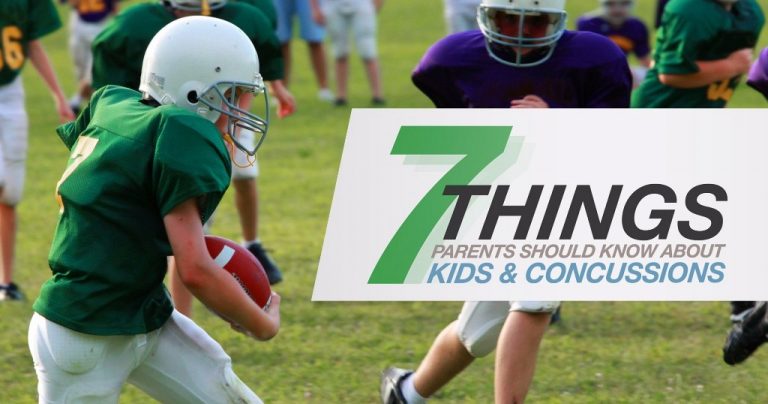
7 Things Parents Should Know About Kids & Concussions
In recent years, the media has focused a lot of attention on sports-related concussions – especially in football. In fact, starting in 2014, after a continuous stream of bad press and a high-profile congressional hearing1, the NFL created their “Diagnosis and Management of Concussion” guidelines2, drastically increasing a focus on hard hits and how teams must respond. While more focus is being given to head injuries in professional and collegiate athletes, concussions in children can be a really serious problem3. The truth is, concussions are drastically underreported and many parents still don’t know what exactly a concussion is, how to recognize it and what a treatment plan for their kids looks like. In order to help bring some clarity to concussions, we’ve put together a list of the 7 things you should know about concussions in children.
1. What causes concussions
A sports-related concussion is a type of mild traumatic brain injury that is caused by a blow (direct or indirect) to the head, face, neck or body. The hit, whether a wrestling slam, a hockey check, or soccer header, causes the brain to shift violently from one side of the skull to the other. This impact on the brain can cause damage and even loss of consciousness. Although football and boxing are more infamous for their concussions, it can really occur from any contact sport.
2. What to Look for with Concussions
The first step in treating a concussion starts with recognizing a head injury has occurred. It’s important that coaches, parents, athletic trainers, and teammates are able to identify which potential head injuries might lead to a concussion. This can be difficult, because the majority of concussions occur without a loss of consciousness and symptoms may take time to manifest. Contrary to popular belief, you don’t have to get knocked-out to experience a concussion.
3. After the hit
While a smaller head trauma may result in a harmless lump, a concussion has some very serious and visible symptoms.
Here are a few of the common symptoms parents should look out for following a head injury:
- headaches
- nausea
- amnesia
- balance issues
- behavioral changes
- difficulty sleeping
- sensitivity to light
- frequent drowsiness and of course,
- loss of consciousness
4. Stop Activity and Test for Concussions
If a concussion is thought to have occurred, the player should be removed from the game immediately and assessed by a physician or healthcare provider on the sidelines. A series of tests should be performed to assess the athlete’s memory, balance, vision, and neurological function. These tests can be performed in about 10 minutes. If a player cannot pass any of these tests, it’s important that they not be allowed to return to play and monitored over the next few hours for any change in symptoms. If there is no licensed healthcare provider on the scene, the player (and their parents) should seek medical attention from a physician or emergency room.
5. Medical Examination After a Concussion
After the initial sideline testing, the player should have a comprehensive medical examination that includes assessing their neurological function, memory, eye function, vestibular function, balance, and walking ability. The physician will also determine neuroimaging, such as a CT scan, which is needed to rule out a more severe brain injury.
6. Concussion Treatment
The usual recommendation is to rest for 24-48 hours followed by a gradual increase in activity, making sure not to aggravate their symptoms with additional impacts. The athletes should avoid vigorous physical or mental effort while they are recovering. In most cases, a 6-step return to activity program is created, with the goal of increasing the players’ daily activity and getting back into the game in 6 days. Each step should be spread out for 24 hours and slowly progress the players’ activity until they have returned to “normal” gameplay. It’s important to note that if a player experiences any recurrence of symptoms during this time, they will typically go back to the last step in which they showed no symptoms until they can finish their program.
7. Recovery after a concussion
The majority of players recover in 10-14 days, however, some have persistent symptoms in which further treatment may be necessary. The player is considered to be clinically recovered when they return to all of their daily activities, both recreational activates and sporting, without any symptoms.
Here’s the point…
Concussions in children is a serious problem that is not discussed enough and often under-reported. If your child has (or you suspect they have) suffered a concussion, physical therapy can help in the treatment of a patients return to activity program, working on improving any injury to the neck due to the impact, or working on any balance or vestibular deficit that may leave them feeling dizzy, off-balance, or “in a fog.” If your child experiences head trauma or show signs of a concussion speak to a physician, then request an appointment here and speak with one of our physical therapists about our concussion management program.
Michael Lenart, DPT
Ivy Rehab in Hackensack, NJ
The medical information contained herein is provided as an information resource only, and does not substitute professional medical advice or consultation with healthcare professionals. This information is not intended to be patient education, does not create any patient-provider relationship, and should not be used as a substitute for professional diagnosis, treatment or medical advice. Please consult with your healthcare provider before making any healthcare decisions or for guidance about a specific medical condition. If you think you have a medical emergency, call your doctor or 911 immediately. IvyRehab Network, Inc. disclaims any and all responsibility, and shall have no liability, for any damages, loss, injury or liability whatsoever suffered as a result of your reliance on the information contained herein.